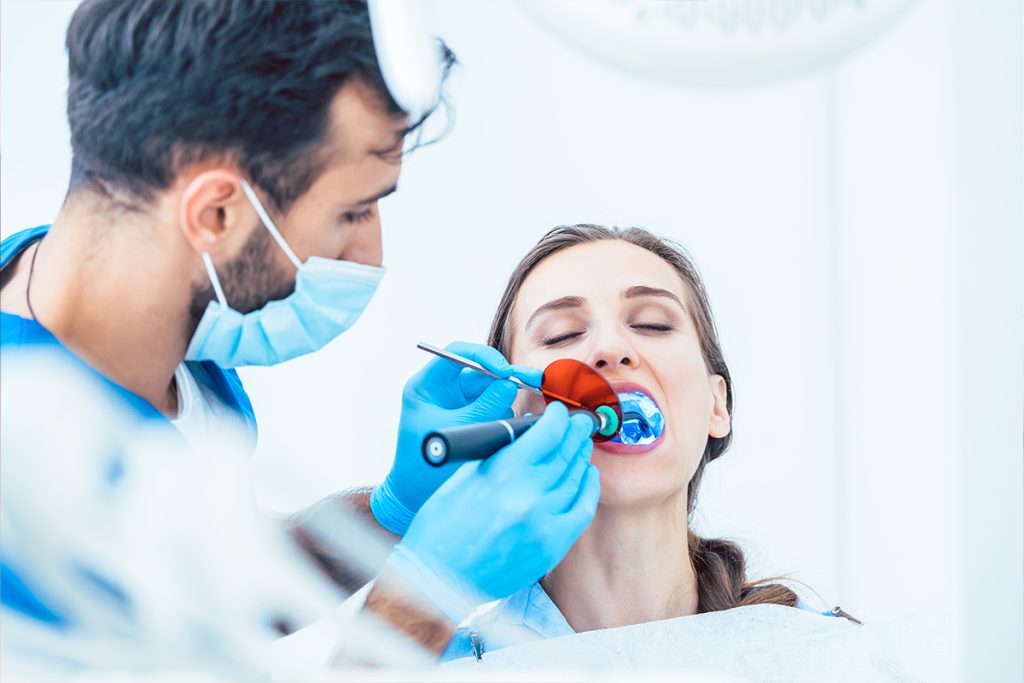
Periodontics is a dental specialty focused on the health of the gums and supporting structures of the teeth. A periodontist diagnoses, prevents, and treats gum diseases while also managing conditions affecting the jawbone and soft tissues. Healthy gums are vital for maintaining overall oral health and ensuring the longevity of your natural teeth.
Scaling and Root Planing
Scaling and root planing is a non-surgical, deep-cleaning procedure that targets plaque, tartar, and bacteria below the gumline. The scaling process removes harmful deposits from tooth surfaces, while root planing smooths the roots to help gums reattach and reduce inflammation. This treatment is an essential step in managing gum disease and preventing its progression.
Gum Grafting
Gum grafting is a surgical procedure used to restore lost gum tissue and cover exposed tooth roots caused by gum recession. By harvesting tissue from another part of the mouth or using donor tissue, gum grafting improves both aesthetics and function. It protects sensitive roots from further exposure and reduces the risk of tooth loss.
Pocket Reduction Surgery
Pocket reduction surgery, also known as flap surgery, is a treatment for advanced periodontal disease. Deep gum pockets caused by the disease are cleaned thoroughly, and the gum tissue is repositioned to reduce pocket depth. This procedure eliminates bacteria-harboring pockets, making it easier to maintain oral hygiene and preventing future infections.
Q1: What causes gum disease?
A: Gum disease is primarily caused by plaque buildup, which leads to bacterial infection. Factors such as poor oral hygiene, smoking, genetics, certain medications, and systemic conditions like diabetes can also contribute to its development.
Q2: How do I know if I have gum disease?
A: Common signs of gum disease include red, swollen, or bleeding gums, persistent bad breath, gum recession, loose teeth, and sensitivity. If you experience any of these symptoms, consult a periodontist for evaluation.
Q3: Is scaling and root planing painful?
A: Scaling and root planing is generally well-tolerated. Local anesthesia is often used to minimize discomfort during the procedure. Post-treatment sensitivity is common but temporary.
Q4: When is gum grafting necessary?
A: Gum grafting is recommended when gum recession exposes the tooth roots, causing sensitivity, increased risk of decay, or aesthetic concerns. It helps protect the teeth and improve the overall appearance of your smile.
Q5: Can gum disease be reversed?
A: Early-stage gum disease (gingivitis) can often be reversed with professional cleanings and improved oral hygiene. Advanced stages (periodontitis) require specialized treatments like scaling and root planing or surgery to manage the condition.
Q6: What happens if gum disease is left untreated?
A: Untreated gum disease can lead to tooth loss, bone loss, and systemic health issues such as cardiovascular disease and diabetes complications. Early intervention is key to preserving oral and overall health.
Q7: How can I prevent gum disease?
A: Maintain good oral hygiene by brushing twice daily, flossing regularly, and using an antimicrobial mouthwash. Schedule regular dental check-ups and professional cleanings, and avoid smoking or tobacco use.
Q8: How long does it take to recover from pocket reduction surgery?
A: Recovery from pocket reduction surgery varies by individual but typically takes about 1-2 weeks. Following post-operative care instructions, such as eating soft foods and avoiding vigorous brushing near the treated area, will promote healing.
Periodontics is essential in maintaining a healthy foundation for your teeth. If you’re experiencing gum issues or seeking preventive care, schedule a consultation with a periodontist to protect your smile!
Address: 934 Hide A Way Road,
Sunnyvale, CA 94086